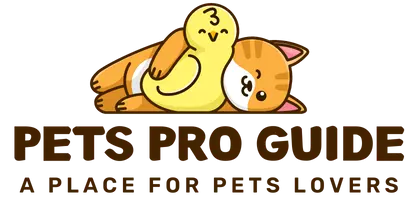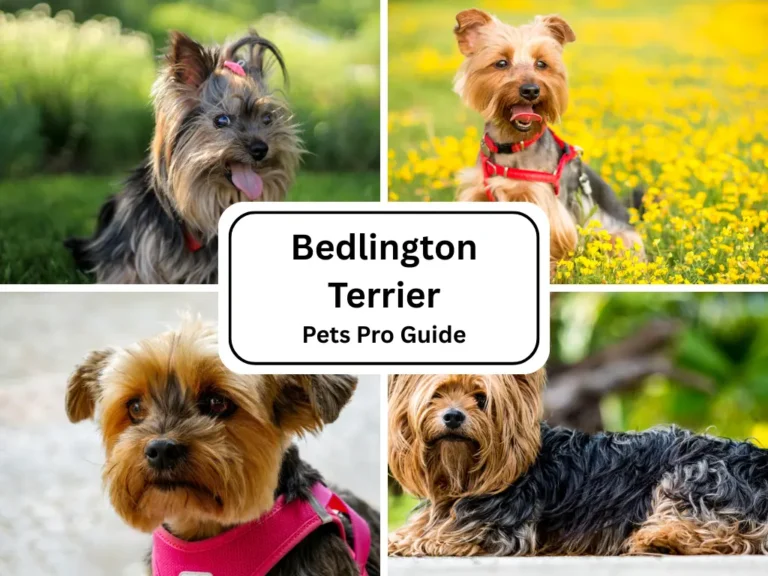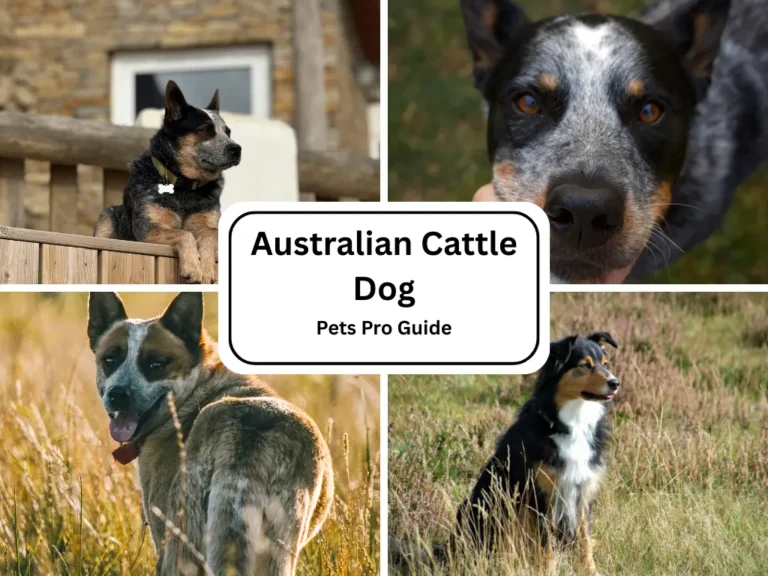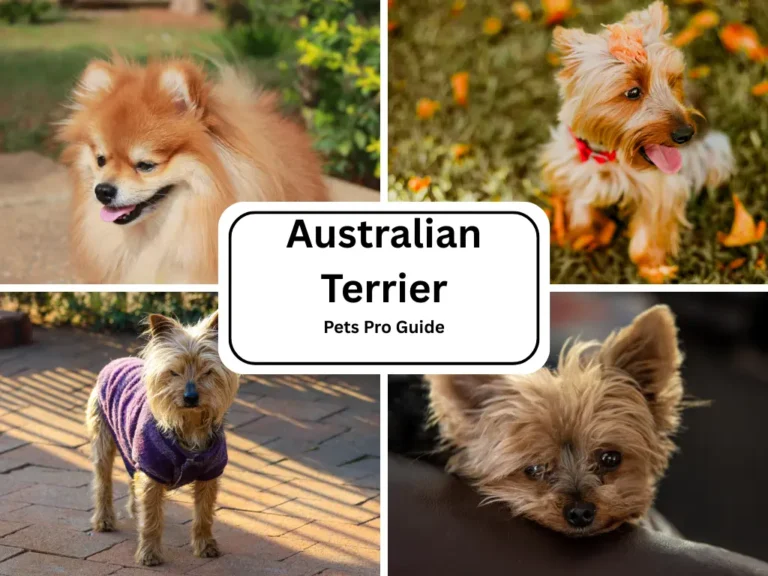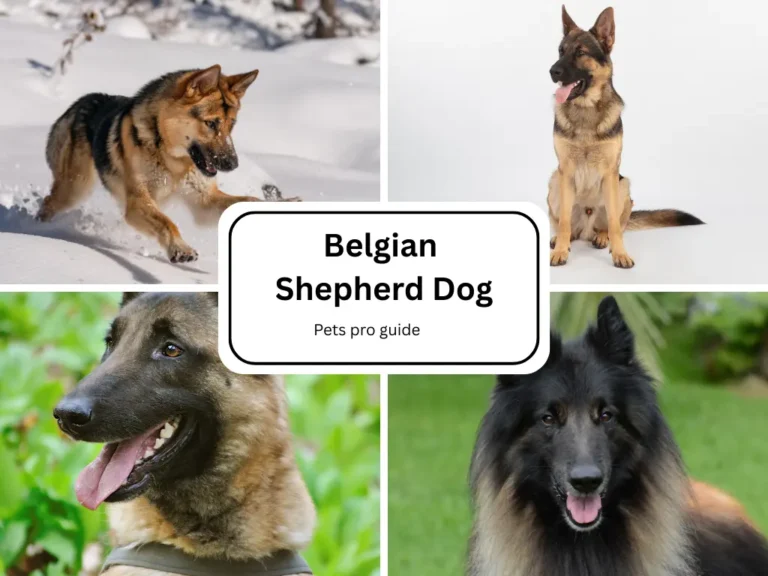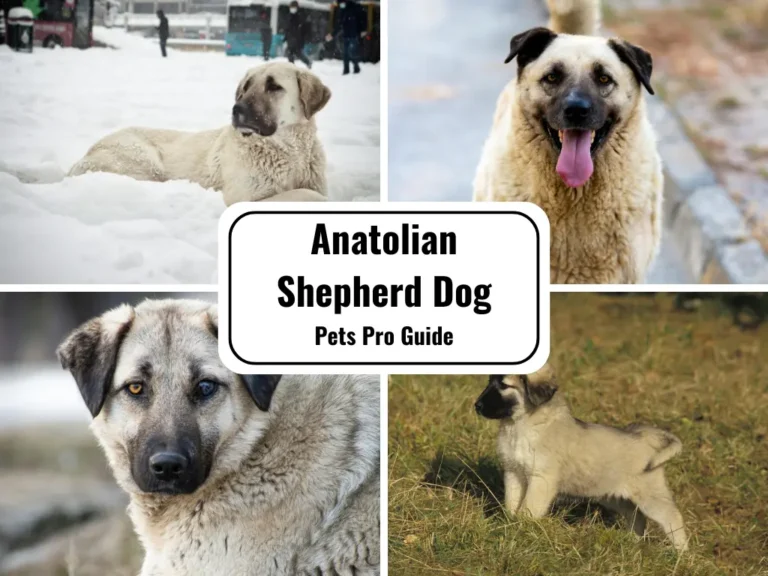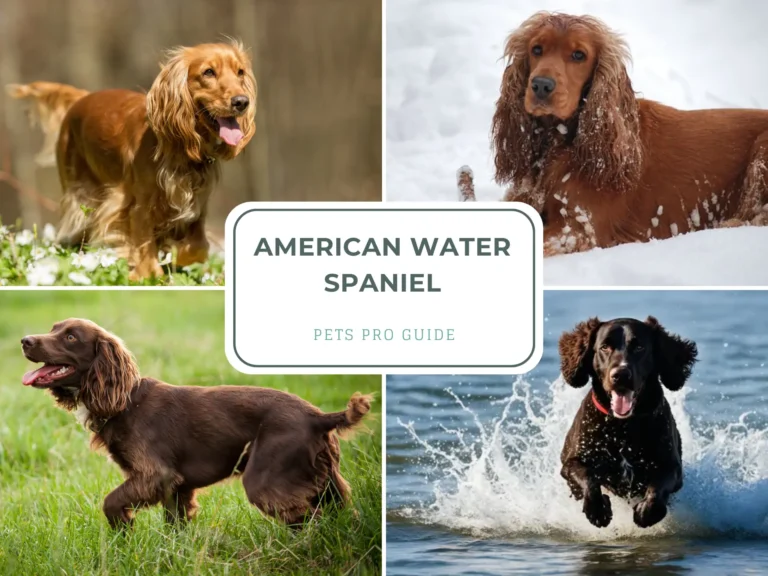Yorkshire Terrier Breed Information: Welcome, readers! Anastasia here, ready to divulge all you need to know about Yorkshire Terrier breed, complete with a delightful compilation of heartwarming pictures!
Welcome to our comprehensive guide on Yorkshire Terrier breed information and pictures. The Yorkshire Terrier, affectionately known as the “Yorkie,” is a small and charming dog breed with a big personality.
In this blog post, we’ll explore the origin, appearance, temperament, health, and more about this delightful companion. Whether you’re considering adopting a Yorkshire Terrier or just curious about this pint-sized pooch, we’ve got you covered. Let’s dive into the world of Yorkshire Terriers!
- Core statistics
- History and Origins
- Other Names for Yorkshire Terrier Breed
- Yorkshire Terrier Size & Weight
- Appearance
- Personality
- Temperament
- Nutrition and Feeding
- Space Requirements
- Training & Exercise
- Yorkshire Terrier Grooming
- Common Yorkshire Terrier Breed Health Conditions
- Yorkshire Terrier Care Pro Tips
- Is Yorkshire Terrier Good Family Dog?
- What to know before you buy a Yorkshire Terrier?
- Yorkshire Terrier Breed Fun Facts
- Yorkshire Terrier FAQs
- Conclusion
- Read More
Also Read: Labrador Retriever Breed Information

Core statistics
Here are some core statistics:
- Size: Large
- Coat: Short and smooth, requires weekly grooming
- Exercise: 2+ hours a day
- Life span: 10-12 years
- Breed group: Gundog
- Temperament: Easy-going, loyal, affectionate
History and Origins
The Yorkshire Terrier hails from England’s Yorkshire region, where they were initially bred to catch rats in textile mills. They were a cross between various terrier breeds, including the Waterside Terrier and the Clydesdale Terrier. Over time, the Yorkshire Terrier’s popularity soared, and they became beloved lapdogs and companions.
Other Names for Yorkshire Terrier Breed
Here are some other names for Yorkshire Terrier:
- Yorkie (a popular nickname)
- Broken-Haired Scotch Terrier (an early name)
Yorkshire Terrier Size & Weight
- Male Yorkshire Terrier:
- Size: 7-8 inches (18-20 cm) tall at the shoulder
- Weight: 4-7 pounds (1.8-3.2 kg)
- Life Expectancy: 11-15 years
- Female Yorkshire Terrier:
- Size: Slightly smaller than males, typically 7-8 inches (18-20 cm) tall at the shoulder
- Weight: 4-7 pounds (1.8-3.2 kg)
- Life Expectancy: 11-15 years
Appearance
Yorkshire Terriers have a small, compact body with a long, flowing coat. Their blue and tan coat is their trademark feature, making them easily recognizable. With their bright, alert eyes and confident stance, Yorkshire Terriers exude elegance and charm.
Personality
Despite their small size, Yorkshire Terriers have big personalities. They are affectionate, lively, and fiercely loyal to their families. Yorkies are known for their spirited nature and often think they’re much larger than they actually are. They make excellent watchdogs, alerting their owners to any potential intruders.
Temperament
Yorkshire Terriers are curious and intelligent dogs that enjoy exploring their surroundings. They can be quite independent at times, but they also crave attention and affection from their loved ones. Proper socialization is essential to ensure they get along well with other pets and children.
Nutrition and Feeding
Providing proper nutrition is vital for the overall health and well-being of Yorkshire Terriers. Feed them a high-quality, balanced diet that suits their age, size, and activity level. It’s essential to control portion sizes to prevent overeating and potential weight gain, which can lead to health issues.

Space Requirements
- Yorkshire Terrier Puppy: Yorkshire Terrier puppies are tiny and delicate, so they need a safe and secure space to explore and play. A small enclosed area with puppy-proofing is ideal.
- Adult Yorkshire Terrier: As adults, Yorkies can thrive in small living spaces, such as apartments, as long as they receive enough exercise and mental stimulation.
Training & Exercise
Yorkshire Terriers are intelligent and quick learners, making them trainable with consistent and positive reinforcement. Here are ten training and exercise tips for your Yorkshire Terrier:
- Early training: Start training your Yorkshire Terrier as soon as possible to establish good behaviors.
- Socialization: Introduce them to various people, places, and animals from a young age to help them become well-adjusted adults.
- Positive reinforcement: Use praise, treats, and rewards to reinforce positive behavior during training.
- Housetraining: Be patient and consistent during housetraining, as small breeds may take longer to master this skill.
- Basic commands: Teach essential commands like sit, stay, come, and leave it for better control.
- Leash training: Yorkies can be prone to pulling on the leash, so teach them to walk politely on a leash.
- Crate training: Introduce crate training early on to provide a safe space and prevent destructive behaviors when you’re not around.
- Mental stimulation: Engage their minds with puzzle toys and interactive games to prevent boredom.
- Short training sessions: Keep training sessions short and fun to hold their attention and enthusiasm.
- Consistency and patience: Yorkies respond well to consistent training methods and positive reinforcement, so be patient and persistent.
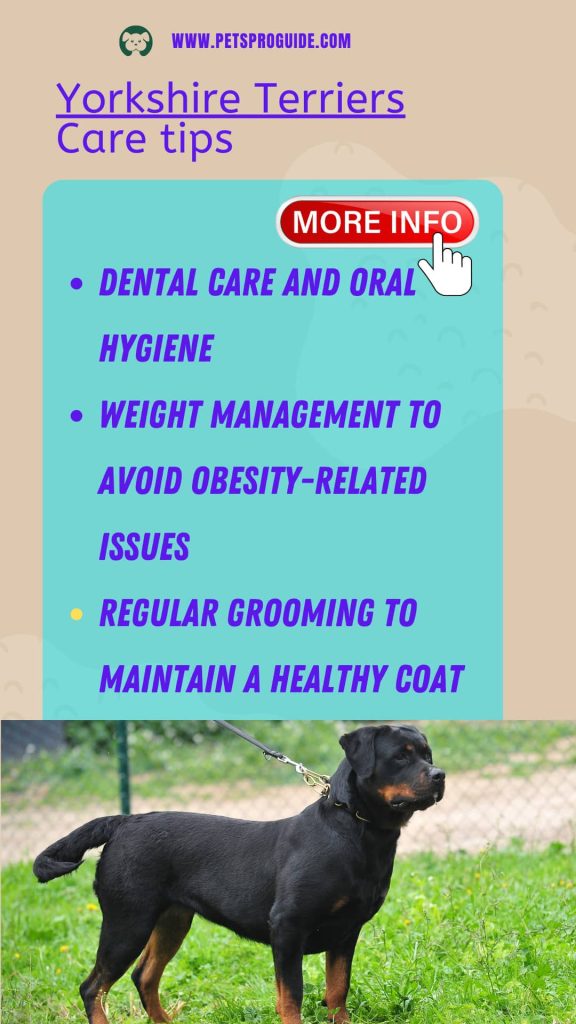
Yorkshire Terrier Grooming
Yorkshire Terriers have a long, flowing coat that requires regular grooming to keep it in top condition. Here are five grooming tips for your Yorkshire Terrier:
- Daily brushing: Brush their coat daily to prevent tangles and mats, especially in the long hair around their ears and legs.
- Bathing: Bathe your Yorkshire Terrier every three to four weeks to keep their coat clean and fresh.
- Eye care: Clean around their eyes regularly to prevent tear staining.
- Dental care: Brush their teeth regularly to maintain good oral hygiene and prevent dental issues.
- Professional grooming: Schedule regular visits to a professional groomer to maintain their coat’s shape and condition.
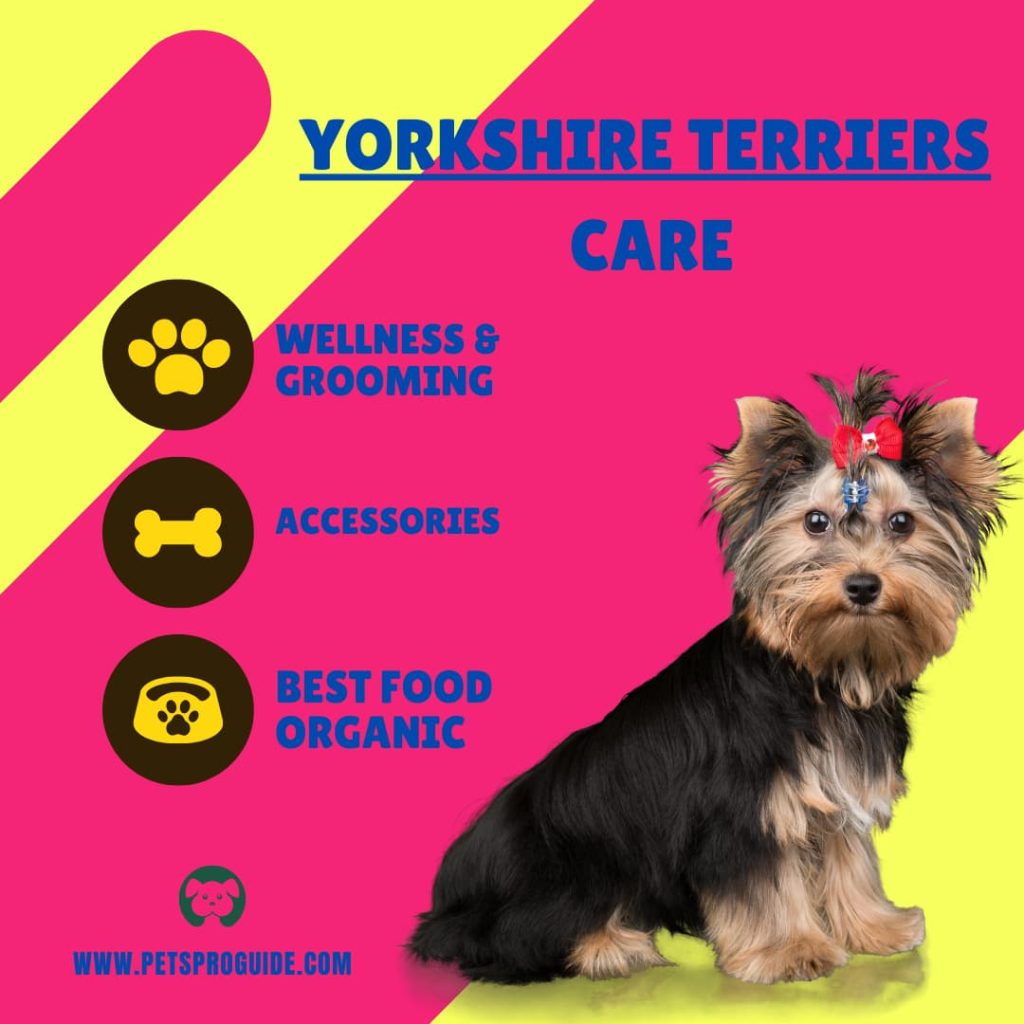
Common Yorkshire Terrier Breed Health Conditions
While Yorkshire Terriers are generally healthy dogs, they can be susceptible to certain health issues due to their small size. Here are ten common health conditions that may affect Yorkshire Terriers:
- Dental problems: Yorkies are prone to dental issues like tooth decay and gum disease.
- Luxating patella: This is a condition where the kneecap dislocates from its normal position.
- Hypoglycemia: Low blood sugar can be a concern, especially in young puppies.
- Tracheal collapse: The windpipe can weaken over time, leading to breathing difficulties.
- Portosystemic shunt: This is a congenital condition where blood bypasses the liver, affecting liver function.
- Legg-Calve-Perthes disease: A condition where the hip joint deteriorates, leading to pain and limping.
- Eye problems: Cataracts, retinal dysplasia, and progressive retinal atrophy (PRA) can occur in Yorkies.
- Collapsed trachea: The cartilage rings in the trachea weaken, causing breathing problems.
- Pancreatitis: Inflammation of the pancreas can occur in some Yorkies.
- Liver shunt: This is a congenital condition where blood flow bypasses the liver, affecting liver function.
Yorkshire Terrier Care Pro Tips
Here are ten care tips to ensure your Yorkshire Terrier’s well-being and happiness:
- Regular veterinary check-ups
- Provide a balanced diet and monitor food intake
- Regular exercise and mental stimulation
- Socialization and training from an early age
- Dental care and oral hygiene
- Regular grooming to maintain a healthy coat
- Monitor joint health, especially in older dogs
- Address any health issues promptly
- Provide a comfortable and safe living environment
- Lots of love and attention, as Yorkies thrive on companionship.
Is Yorkshire Terrier Good Family Dog?
Yes, Yorkshire Terriers can make excellent family dogs, especially in homes with older children. They are affectionate and loyal, but their small size makes them delicate, so supervision is crucial around young children.
What to know before you buy a Yorkshire Terrier?
Before bringing a Yorkshire Terrier into your home, consider these ten important points:
- Size and fragility: Yorkies are tiny and delicate, requiring gentle handling.
- Grooming commitment: Be prepared for regular grooming and maintenance of their long coat.
- Exercise needs: Despite their small size, Yorkies need daily exercise and mental stimulation.
- Training consistency: Consistent training is essential to manage their spirited nature.
- Socialization importance: Early socialization is vital to ensure they get along well with other pets and people.
- Health concerns: Be aware of potential health issues common to the breed and seek regular veterinary care.
- Supervision with children: Caution is necessary when interacting with young children due to their fragility.
- Space requirements: Yorkies can adapt to small living spaces but still need room to move and play.
- Time and attention: They thrive on companionship and need time and attention from their owners.
- Energy level: Yorkies may be small, but they have plenty of energy, so plan for regular play and exercise.
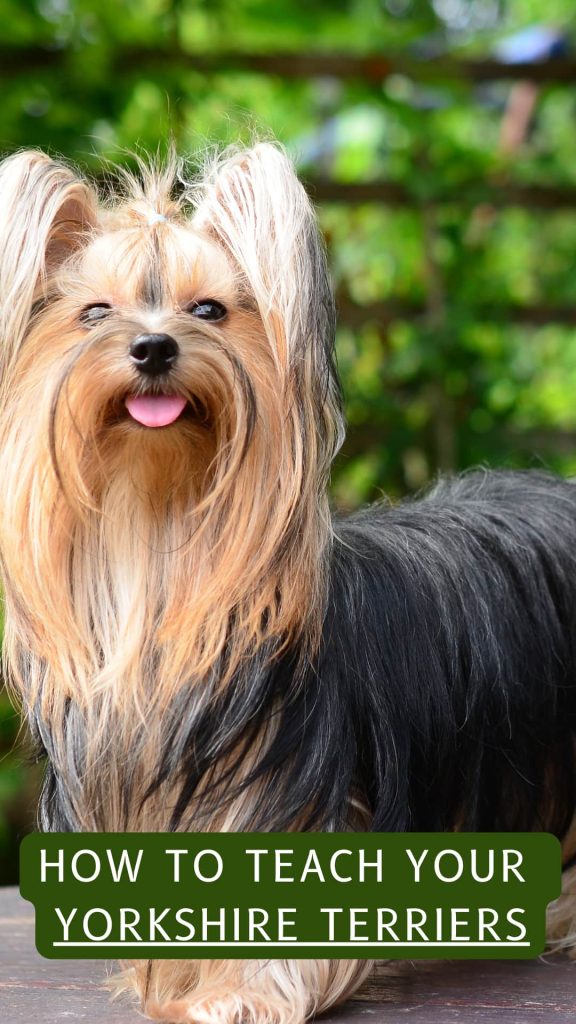
Yorkshire Terrier Breed Fun Facts
Here are ten fun and interesting facts about Yorkshire Terriers:
- Yorkshire Terriers were originally bred to catch rats in textile mills.
- They were known as “ratters” before becoming fashionable companion dogs.
- The first Yorkshire Terrier was registered with the American Kennel Club (AKC) in 1885.
- Their luxurious coat was originally gray and gradually changed to blue and tan.
- Yorkies have a terrier spirit, despite their small size.
- They are one of the most popular toy breeds in the United States.
- Yorkies have appeared in numerous movies and TV shows, often portraying fashionable and pampered pets.
- They have a bold personality that makes them unafraid of larger dogs.
- Despite their dainty appearance, Yorkies are known to be tough and resilient.
- The world’s smallest dog, according to the Guinness World Records, was a Yorkshire Terrier named Sylvia who weighed just 4 ounces (113 grams).
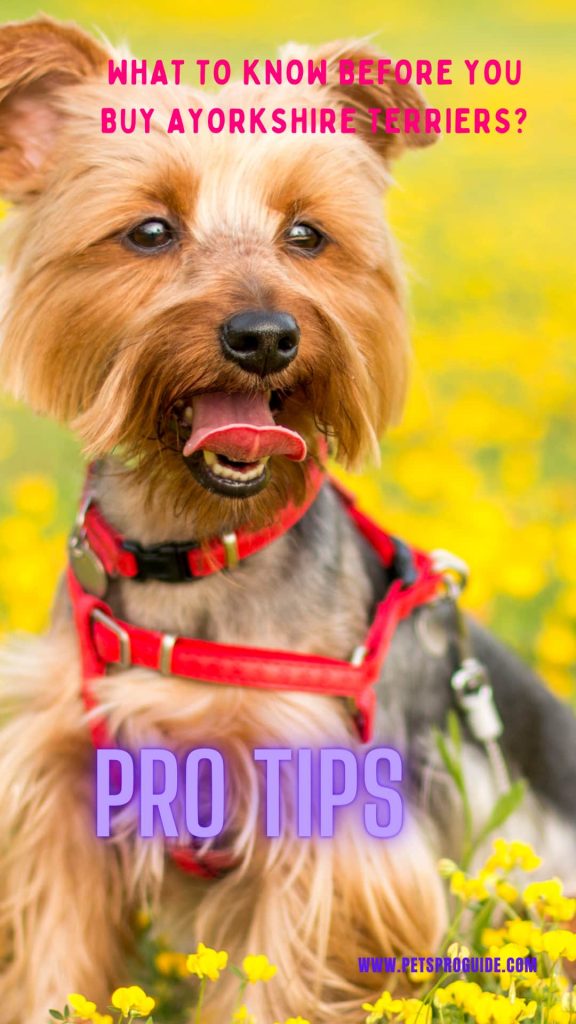
Yorkshire Terrier FAQs
Q: Are Yorkshire Terriers hypoallergenic?
A: Yes, Yorkies are considered hypoallergenic due to their low shedding and hair-like coat.
Q: Are Yorkshire Terriers good with children?
A: They can be good with older children who handle them gently, but supervision is necessary due to their small size.
Q: Do Yorkshire Terriers get along with other pets?
A: Proper socialization can help them get along with other pets, but they may assert themselves.
Q: Are Yorkshire Terriers easy to train?
A: They are intelligent but can be stubborn, so consistent training is essential.
Q: How much exercise do Yorkshire Terriers need?
A: They need daily exercise and mental stimulation but don’t require vigorous activity.
Q: Do Yorkshire Terriers bark a lot?
A: Yorkies can be vocal and may bark to alert their owners to anything unusual.
Q: Do Yorkshire Terriers require a lot of grooming?
A: Yes, their long coat requires regular grooming to prevent tangles and mats.
Q: Are Yorkshire Terriers prone to health issues?
A: Like all breeds, they can be susceptible to certain health conditions, so regular vet check-ups are essential.
Q: Are Yorkshire Terriers good apartment dogs?
A: Yes, they can adapt well to apartment living, but they still need exercise and mental stimulation.
Q: Are Yorkshire Terriers good for first-time dog owners?
A: They can be suitable for first-time owners but require commitment to grooming and training.
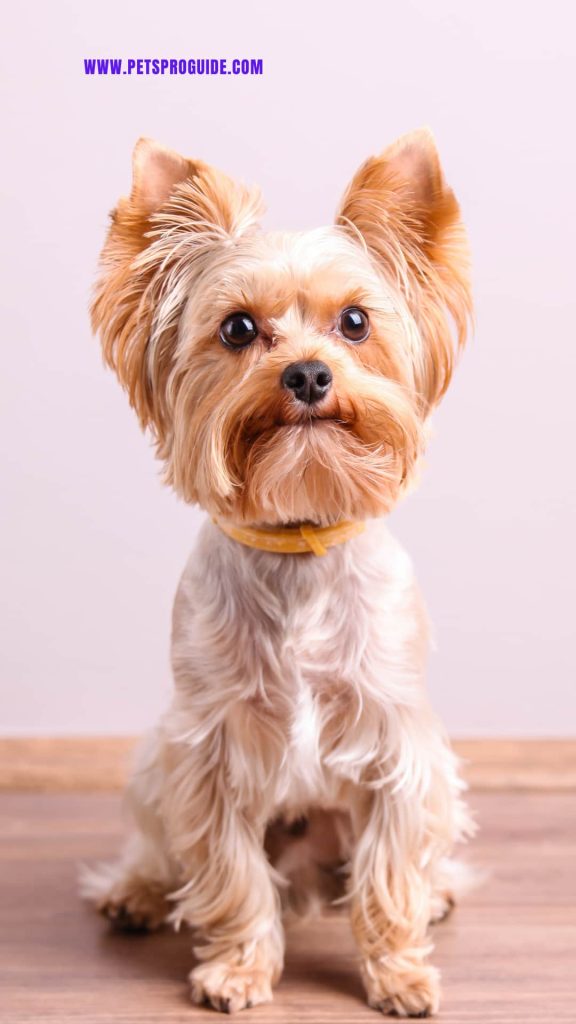

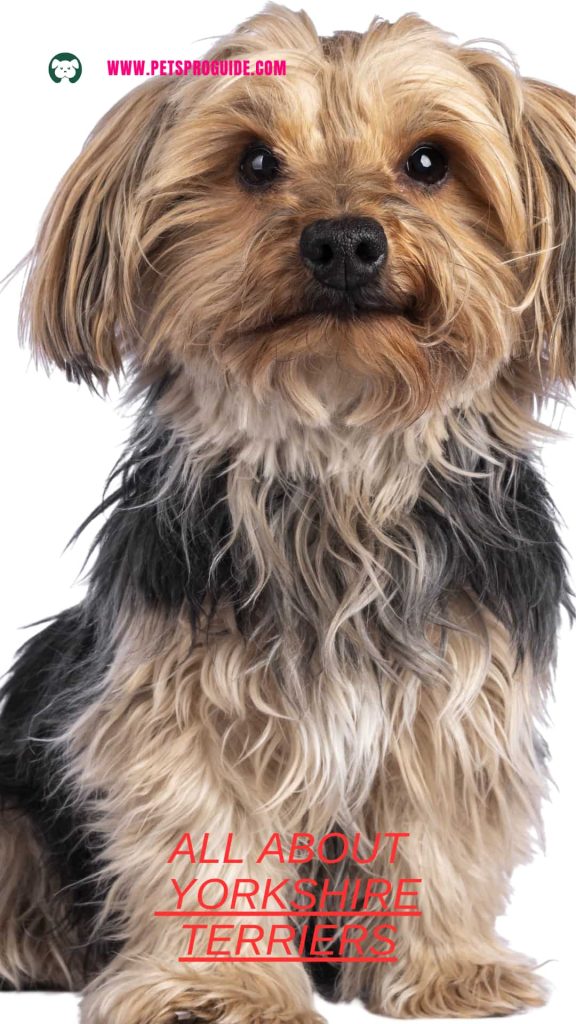
Conclusion
Yorkshire Terrier is a small dog with a big heart. They may be tiny, but they possess a feisty spirit and boundless affection for their families. Their elegant appearance, combined with their loving nature, has made them a beloved breed worldwide. However, prospective owners should be prepared for their grooming needs and spirited personality. With proper care, training, and socialization, Yorkshire Terriers can make delightful companions for individuals and families alike.
If you really enjoyed the article “Yorkshire Terrier Breed Information and Pictures,” then I would be very grateful if you’d help it spread by emailing it to your friends or sharing it on Twitter, Instagram, or Facebook. Thank you!
